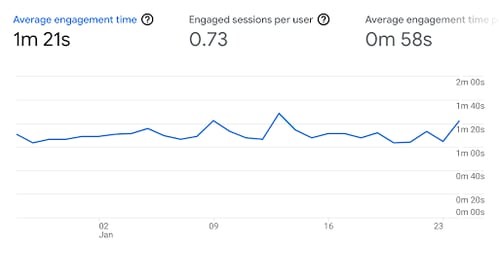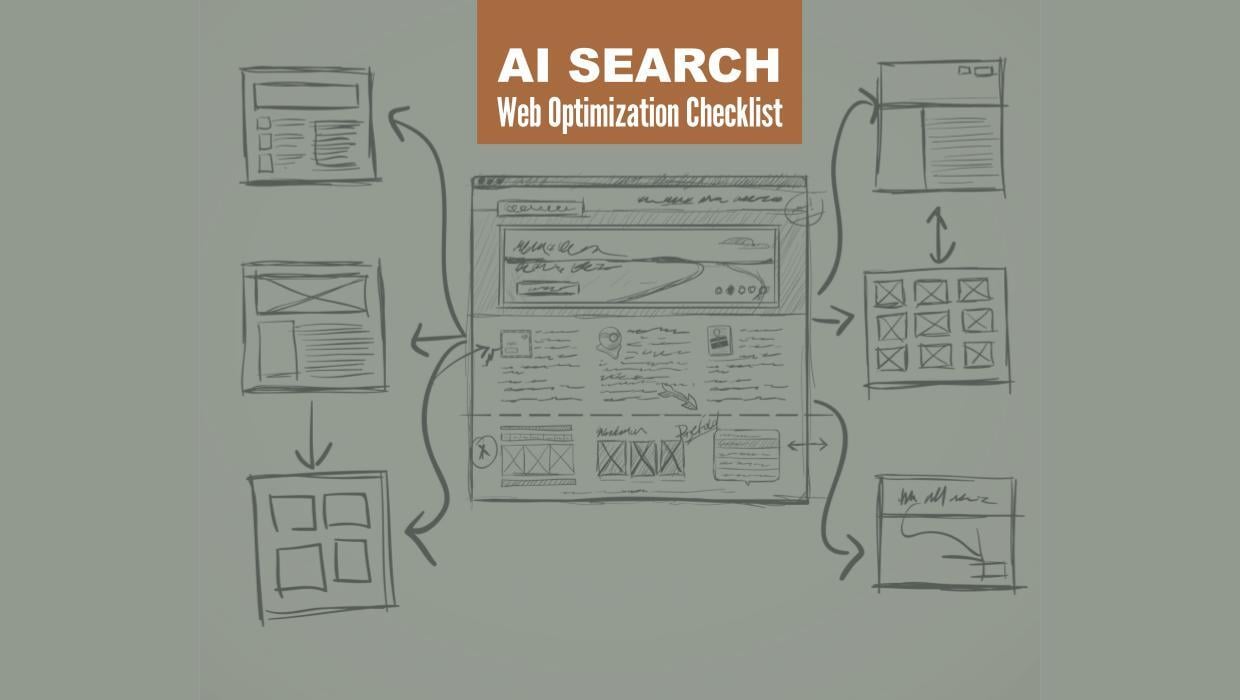WHAT IS GA4? WHAT MARKETERS NEED TO KNOW
Written by
Effectively retain website visitors. Drive more website traffic. Improve marketing campaigns. You likely already know the benefits of capturing website visitor behavior by using Google Analytics.
After collecting visitor insights and tracking website performance, you can better discover and identify trends and patterns in how visitors engage with your website. And then you can adjust campaigns accordingly. Basically, that’s how you use Google Analytics for marketing.
Google Analytics — as most marketers likely know it — is technically referred to as Universal Analytics. Now, however, things have changed a bit since Google announced Google Analytics 4 (GA4) in 2021.
You might think there isn’t a big difference, but making the change could have a significant impact on how you track users and report on marketing metrics.
Fear not: we’re here to give you a basic overview of the difference between google analytics 4 vs. universal analytics and answer questions like:
- What is Google Analytics 4?
- Why is Google switching to GA4?
- Will my website have to use GA4?
- What’s different about GA4 vs. Universal Analytics?
- What are the benefits of GA4?
- Should I Delete Universal Analytics and Replace it with GA4?
What is Google Analytics 4?
Formerly known as the beta tracking property “App + Web,” Google Analytics 4 properties can be used for a website, an app, or both of them together. GA4 has officially replaced Universal Analytics as the default for digital analytics measurement. It is an upgraded version of Google’s previous analytics tools.
Why is Google Switching to GA4?
Basically, Google is saying that this switch is “designed for the future of measurement.” It’s a next generation analytics tool that will provide analysts better access and insights into the buyer’s journey with both website and app data inclusion. GA4 will include further privacy for users of websites and apps, but offers solutions for marketers and analysts as well. It also provides enhanced insights into eCommerce transactions, Google Ads, and cross-platform interactions.
Will My Website Have to Use GA4?
For those currently using standard Universal Analytics, there really isn’t a choice on whether to switch. Universal Analytics will stop processing data on July 1, 2023 (October 1, 2023 for Analytics 360 properties). While that seems a long way off, it’s better to migrate sooner than later so your new property can start collecting data.
If you don’t set up GA4 properties now, it will be difficult to compare 2023 data to 2022, so it’s best to set up GA4 well before the universal analytics sunset date.
Universal Analytics historical data will be available for a short time after the cut-off date, but it will no longer collect data. It’s recommended to download any historical data you want to capture prior to July 2023.
What’s Different About GA4 vs. Universal Analytics?
The new analytics tool allows marketers to confirm which KPIs are important by measuring the data that makes the most sense, allowing for a more customized dashboard. For example, you can specify conversions based on parameters that meet certain conditions, providing a more accurate view.
The biggest change for marketers is that GA4 is an engagement-based model, not a session-based model. In other words, it measures events in GA4 instead of hit types. That way you can associate multiple user sessions and activities for a single user ID to get a more accurate picture of engagement.
The Google Analytics User ID is used to associate multiple user sessions and activities with a unique ID. With it, you can get a more accurate user count, analyze the signed-in user experience, and understand user behavior across devices.
For example, the “time on page” metric has been replaced by engagement time. You can still see session data, but engaged sessions are what’s important. In this event-based data model, what’s an engaged session?
In GA4 an “engaged session” is a session that lasts 10 seconds or longer, has one or more conversion events, or has two or more screen or page views.
Events now more fully see what action a user took and can add context to the event, capturing specific pieces of information. It captures the amount of time a user spends actually engaging with the page (scrolling, for instance) and if that page is the primary window being viewed. There are also other changes to the setup, dashboard, cross domain tracking, filters, etc.
Bounces do not exist in GA4 (although you could get a similar number by subtracting engaged sessions from overall sessions). Instead, engagement rate — the ratio of engaged sessions to total sessions — shows whether users are interacting with your content. How do you calculate engagement rate? If you have 1,000 total sessions and 110 of them are engaged sessions (see definition above), the engagement rate is 11%.
What Are the Benefits of GA4?
OK, so GA4 focuses on events instead of sessions, which gives you, as a marketer, more control over the kind of data you collect. What other benefits does GA4 provide?
- Measures data from both a website and an app
- Supports cross-domain tracking
- Has enhanced custom reporting and visualization
- Can use machine learning to predict user behavior
- Is designed to work without cookies or identifying data; it’s nearly “future proof”
GA4 also makes it easier to set up conversion tracking. With Universal Analytics, data is tracked based on page views/hits. If a user’s action doesn't open a new page on the tracked domain — such as a click to play a video — it cannot be tracked. (There is the ability to also do event tracking in UA, but a Google Tag Manager setup is required to do so.)
GA4’s tracking protocols are different, so it easily handles event tracking. GA4 is completely event based, though different from the events you can track in UA. A user does not need to change pages for the event to happen.
For example, sitting on a page for 10 seconds will trigger an engagement event. These events can also be used in apps, which do not have page views.
As an inbound marketer, you need to know how GA4’s benefits affect you. You’ll need to start thinking about your website metrics differently. Now, as you define your marketing goals, think about engagements, conversions, and custom metrics instead of just what Google Analytics has always measured, some of which were considered vanity metrics.
GA4 will also be helpful to web developers. It has filters that allow for traffic blocking as well as a new debug mode that separates tag manager events out and shows that they are firing.
Lastly, because Universal Analytics is no longer being improved, you’ll definitely need to move to GA4, and soon.
Should I Delete Universal Analytics and Replace it with GA4?
We’re not going to cover how to add Google Analytics to a website or setting up G4. You know how to search on Google, and there’s no shortage of Google Analytics 4 training or information (it’s now the default when you create a new property).
It’s important to know, however, that it is still possible to track Universal Analytics properties…for now. So, the short answer is “no,” you don’t need to delete Universal Analytics. But it will eventually be deleted for you, so go ahead and set up GA4 now.
You can run Universal Analytics in parallel to GA4 up until it stops capturing data on July 1, 2023. After that, only GA4 will work. Again, be sure to download all your historical Universal Analytics data before it’s permanently deleted.
Is making the switch to GA4 on your website time intensive?
It doesn’t take long to install it on your website, which starts collecting data on the default events available. What will likely take more time is understanding the difference between GA4 and Universal Analytics, and then creating goals and the custom events to capture the data that’s specific to them.
Remember, there are ways to leverage both Google Analytics and HubSpot to get a complete analytic view of your website’s performance as it relates to your inbound growth goals.
GA4 provides marketers with a more complete cross-channel view of the customer lifecycle and offers more data and smart ways to act on those web-specific insights.
Since you care about the effectiveness of your website as part of your holistic inbound prgram, you may want to read more about capturing marketing metrics that really matter. Check out our eBook below to help you know which metrics matter to the C-suite and how to prove the value of your marketing efforts.
Subscribe To Our Blog
Information. Insights. Ideas. Get notified every time a new Weidert Group blog article is published – subscribe now!
You May Also Like...

Search Engine Optimization
Optimize Your Industrial Website for AI Search

Marketing Technology
Why Unified Data Efforts Fail (and How Manufacturers Can Fix It)

Search Engine Optimization
How Falcon Rebuilt Industrial AI Search Visibility in 2025
Accelerate Your Growth with
Weidert Group
If you’re ready to explore a partnership, request a personalized consultation with our team.


